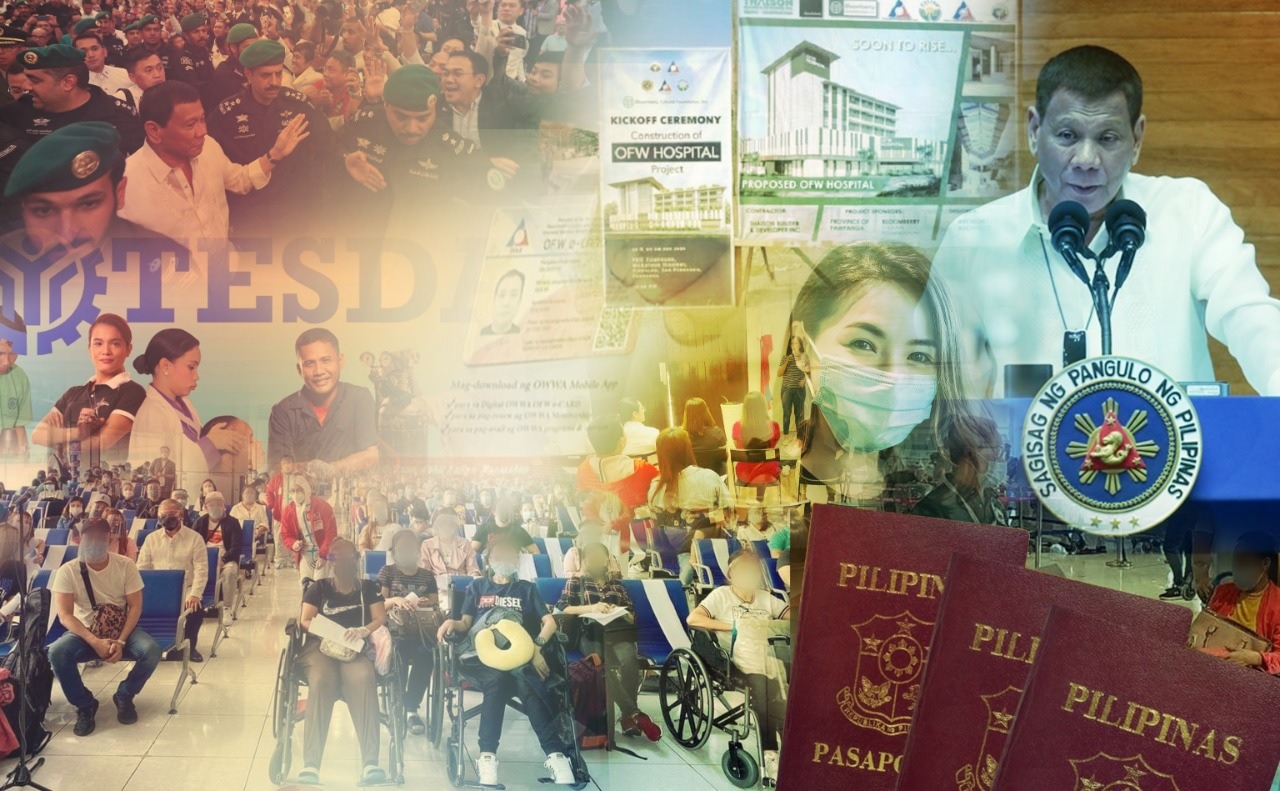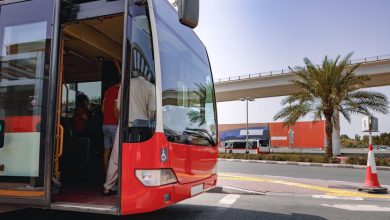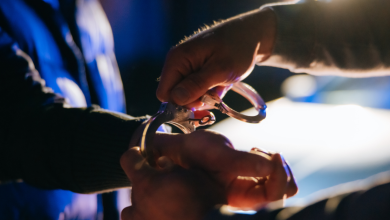President Rodrigo Duterte’s report card for the legacy he will leave behind when his term ends in 2022 will be a mix of fist bumps and challenges the president still has to accomplish for this final year. While his administration can boast a clutch of landmark accomplishments, Filipinos still expect more out of his stewardship.
Ahead of his final State of the Nation Address (SONA) on July 26, Duterte had downplayed his legacy, saying that his administration’s projects and promises will ‘speak for itself’.
“Nothing. All I want the people [to do] is to just look around. Hindi ko ipagyabang. Unang-una hindi ko ito pera. That’s not my money. I will just mention what were the projects completed without necessarily attributing the miracle to me. Worker ako ng government. Nagtrabaho lang ako so wala ako dapat ipagmayabang,” said the President when asked what legacies he will share for his last SONA.
The Filipino Times presents the highlights of the President’s most significant achievements as well as unfulfilled promises to overseas Filipino workers (OFWs).
SONA 2016: Ten-year passport validity
One of Duterte’s first moves for OFWs and Filipinos in general during his first two years in service was the push to extend the validity of passports. The President even asked Congress if it’s possible to extend it for three decades.
“Tutal kayo naman ang maggagawa ng batas, you’re the ones who will pass the law, even if you make it good for 30 years, okay ako, bahala kayo. Basta stretch a little bit,” said the President during his first SONA.
The president reiterated his call during his second SONA in 2017. During that year, the Department of Foreign Affairs had issued Department Order No. 010-2017 that provides implementing rules and regulations for the brand new 10-year passport for all Filipinos. By January 2018, OFWs began reapplying for their new passports which now have a ten-year validity.
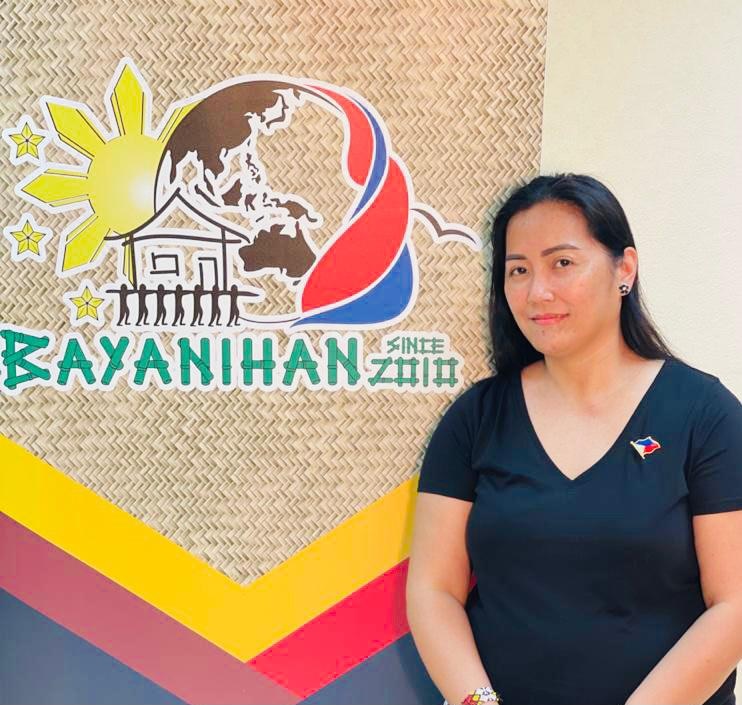
Sheryl Palacios-Manalo, a Senior Health Unit Coordinator in Abu Dhabi, said: “Bilang OFW, isang napakalaking bagay na naging 10 years ang validity ng Philippine Passport. Nakaka-menos gastos na tayo sa palagiang pag-renew ng ating pasaporte.”
SONA 2016: Financial literacy for OFWs
Overseas Filipinos always had a mention in Duterte’s state of the nation address. For one, OFW remittances keep the Philippine economy stay afloat, even amid the impact of the global pandemic that rendered hundreds of thousands of Filipinos abroad jobless.
According to data from Bangko Sentral ng Pilipinas (BSP), OFW remittances stood at $30.1 billion in 2019, and only dipped slightly to $29.9 billion in 2020, despite the precarious effects of COVID-19 on the global economy.
To help OFWs have a better understanding as to how to handle their finances, Duterte’s first SONA in 2016 pushed for mandatory financial education for all Filipino migrants as well as programs that will encourage entrepreneurship. This measure only came into fruition in 2019, with the launch of “Pinansyal na Talino at Kaalaman or PiTaKa”.
For some UAE-based Filipinos, the launch of this program spearheaded by the Overseas Workers Welfare Administration (OWWA), in cooperation with BSP and the BDO Foundation came a little late, especially those who were part of the more than 600,000 OFWs forced to leave abroad due to joblessness. On the contrary, many OFWs said the program was very much timely because many have now realized the importance of turning their backs from the habit of sending home or spending all their earnings.
In the UAE, the Philippine Embassy and the Philippine Consulate have also launched several Financial Literacy programs tied up with local experts and several government-led agencies such as the Bureau of Treasury for “Premyo Bonds” as a form of investment, in a face-to-face format that transition to a hybrid digital seminar session during the year of the pandemic.
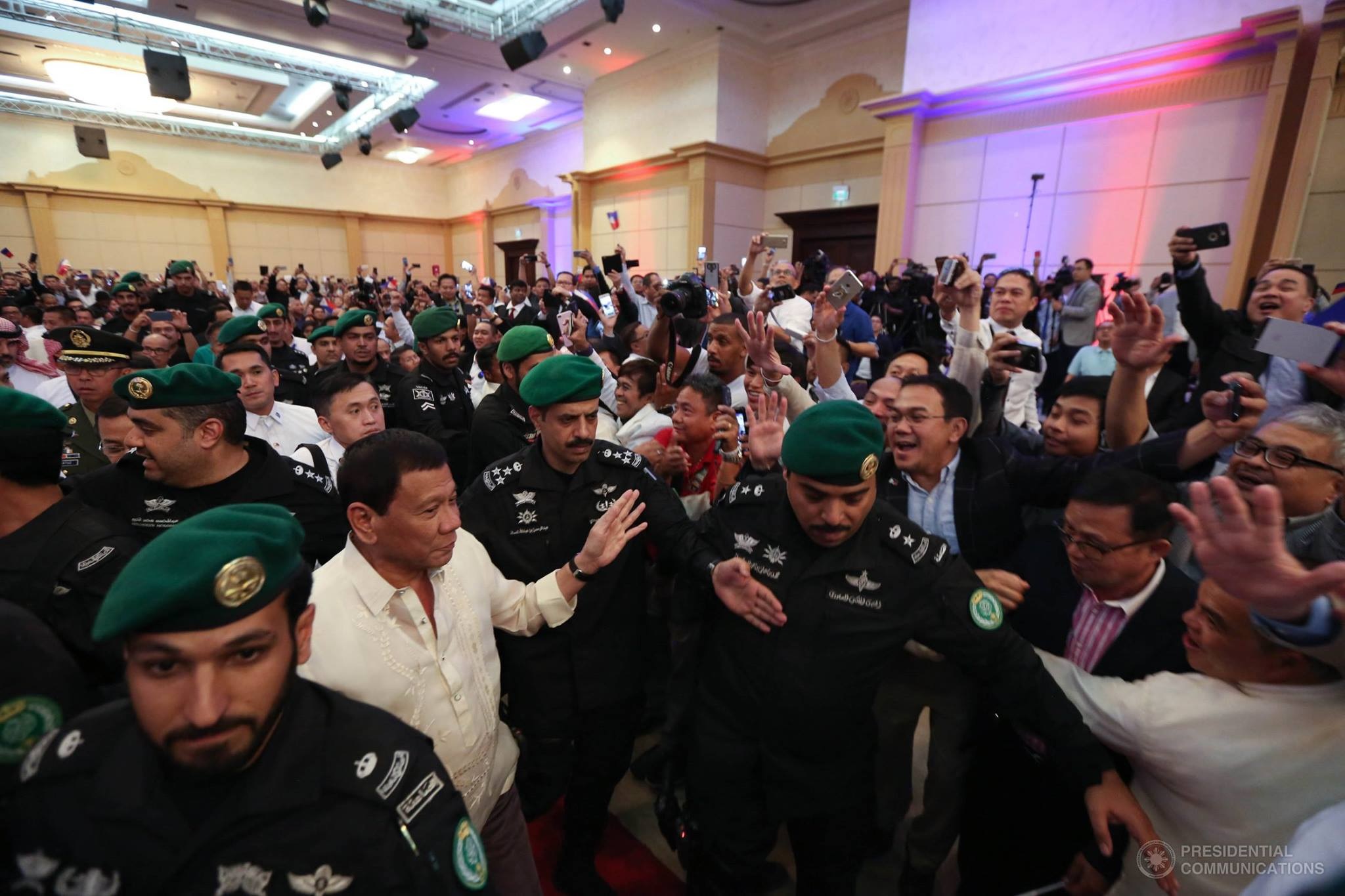
SONA 2017: State visit to Gulf
Duterte’s first year into the presidency witnessed visits to three states in the Arabian Gulf including Saudi Arabia, Bahrain, and Qatar from April 10-17, 2017.
His visit to these three Gulf states made OFWs in the UAE anticipate the president’s eventual visit to the country, but it never came to fruition. Duterte clinched a huge 51,879 votes or 83.5% of votes in the UAE during the 2016 presidential elections, according to statistics from the Philippine Embassy.
The latest update was that President Duterte was supposed to visit the Philippine pavilion at the Expo 2020 Dubai last March, but that too got delayed due to the pandemic. With just a year in power, Duterte’s visit to the UAE is up in the clouds and might not even come to reality, considering travel restrictions and risks posed by the pandemic.
SONA 2018: Protection for migrant workers
In 2018, Duterte vowed to ensure the well-being of all migrant workers by working with host countries to ensure the welfare of all OFWs.
During his term, he witnessed the deaths of several Filipinas in Kuwait – one of the most horrific cases was that of Joanna Demafelis, a household service worker whose body was found in a freezer. The Duterte administration then enforced a band-aid solution in the form of a temporary deployment ban in February 2018 for Kuwait-bound OFWs. The Philippines also initiated a voluntary repatriation program for Filipinos, of which 4,000 came home within a month, until March 2018.
By May 2018, the Philippine government lifted the ban after the signing of a memorandum of understanding for the protection of domestic workers in Kuwait.
The relations between the Philippines and Kuwait were tested once again when Jeanelyn Villavende was killed at the hands of her employers in December 2019. This led to a partial deployment ban that lasted from January to February 2020.
To help prevent these situations from taking place, Duterte signed a law that assigns social welfare attaches across countries where many OFWs live, including the UAE. However, OFWs note that the problem should be dealt with from its roots – the unabated human trafficking in the Philippines.
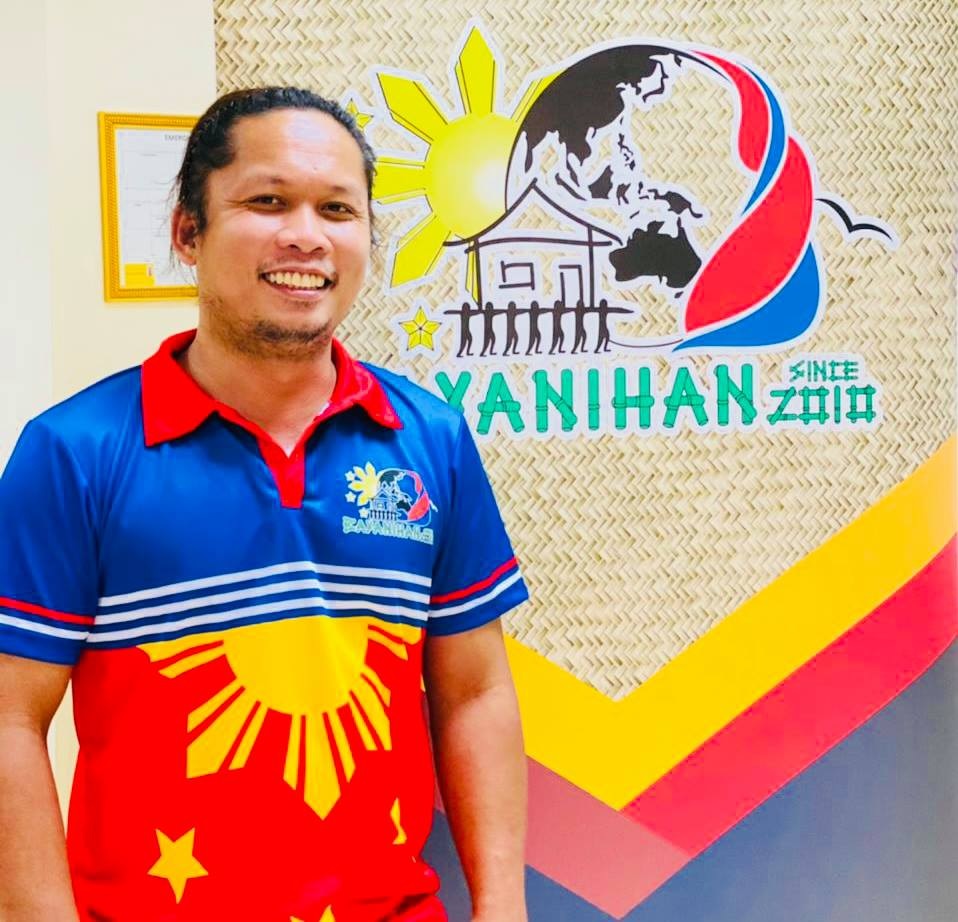
Josh Leron, a senior storekeeper for 12 years in the UAE, suggests that Duterte should focus on preventing more Filipinos from becoming victims of human trafficking. Recently, Department of Labor and Employment (DOLE) Secretary Silvestre Bello said a Filipina, who was repatriated after she was raped in Saudi. Later on, it was revealed that the Pinay was now two months pregnant.
“Napakasama ng ginawa nila sa ating kababayan. Sa takot lang niya, hindi na siya nagsampa ng kaso doon at minabuti na niyang umuwi. Masakit man sabihin, two months nang buntis yung atin kababayan, clear proof na napagsamantalahan,” said DOLE Secretary Silvestre Bello III.
For Leron, he said: “Sa tingin ko nagkukulang pa ang administrasyon ni PRRD sa anti-human trafficking kasi may mga illegal recruiter pa rin na nakakapagpadala ng mga tao sa ibang bansa na hindi dumadaan sa tamang proseso. Hindi pa rin nawawala ang tinatawag na ‘escort’ system sa Immigration sa Pilipinas na kasabwat ng mga illegal recruiters.”
In the UAE, an OFW named Shiegrid Santos was also believed to have died at the hands of her employer. Her family said the Filipina had been telling them that she had been experiencing maltreatment. The case was still under investigation, but her employer and some people involved have been taken into police custody.
“May kaunting diperensya ang kamag-anak ng employer niya. In fairness yung employer niya ang hindi may kagagawan. Ang may kagagawan yung kamag-anak na may diperensya sa pag-iisip. Yung kababayan natin ay nasa morgue at hininhintay nalang po ang kanyang repatriation. We are doing everything na maiuwi ang ating kababayan,” said Sec. Bello.
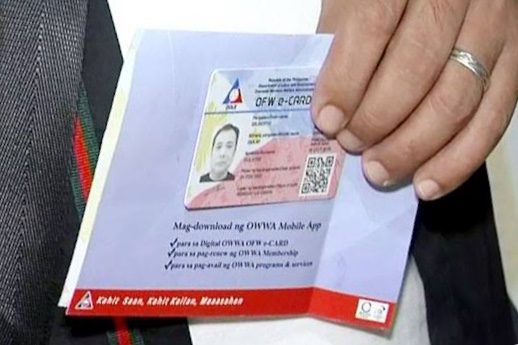
SONA 2018: OFW E-card
The OFW E-card, which was launched in 2018 was supposed to replace the overseas employment certificate (OEC), which was deemed by many OFWs as an added burden for them. Although applications for the OFW e-Card runs active to date, obtaining it was futile because it was not being recognized by the Bureau of Immigration as an OEC replacement.
Jasper Co, a nurse in Abu Dhabi for five years, said: “Hindi na po siguro ako mag-a-apply nitong card kasi parang pampasikip lang naman sa wallet at hindi naman magagamit so sayang lang lalo na’t pupunta naman ako ng ibang bansa para mag-migrate. Kung siguro yung OFW E-card mismo na-a-apply at pwedeng makuha dito sa UAE mas maganda. Kasi ngayon kailangan ko pang umuwi sa Pilipinas para lang makuha yung actual card.”
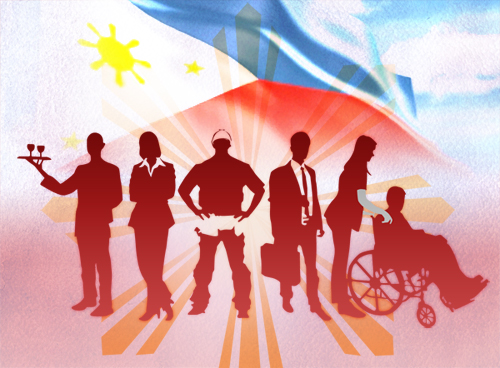
SONA 2019: Department of Overseas Filipinos
It was in 2016 when Duterte first began floating the idea of merging and consolidating departments related to OFWs. When he noticed that there seemed to be no action for the past three years, he proposed the idea of launching an OFW Department in 2019 to better serve all OFWs in a one-stop-shop to cater to all of their concerns.
However, both Senate and Congress still question the need for a separate Department for Overseas Filipinos (DOFIL), stating that these are already fulfilled by agencies under the Department of Foreign Affairs (DFA)’s Office of the Undersecretary for Migrant Workers’ Affairs (DFA-OUMWA) and the Department of Labor and Employment’s Philippine Overseas Employment Agency (POEA) and OWWA.
This did not deter President Duterte from certifying the bill as urgent this March 2021, as he has been very vocal on his promise to create a dedicated department for OFWs.
“I strongly urge Congress to pass a law establishing the Department of Overseas Filipinos [focused] solely on addressing the concerns of Filipinos abroad and their families. Kawawa kasi itong ating mga overseas. If it’s only an office there in the Labor department they are overworked or for whatever reason, their needs, their pleas are not really attended to with dispatch and with care. I will go for it. We will need it to help them,” said President Duterte who reiterated his call during his fifth SONA in 2020.
The majority of OFWs agree to the creation of a new department. A survey of 5,000 respondents launched by WR Number research in December 2020 found that 75% or 3 out of 4 Filipinos said that they agree to implement the measure (44% strongly agree, 31% agree).
OFW Group Migrante International Coordinate John Monterona questioned where the Php 15B OFW Trust fund will go if the new Department will be established. “We stand firm against the proposal, referring to HB191, or to any other similar executive or legislative initiatives as its real intent is only to corner the now P15 billion OFWs trust fund held in trust to the government care of the Overseas Workers Welfare Administration. Transforming OWWA, which is a quasi-government corporation fully funded by OFWs membership contribution into a government-owned and -controlled corporation (GOCC), poses a serious dilemma especially on the nature of the OFWs funds held in trust to the government,” said Monterona.
Creating the department itself from the remnants of former agencies is also a challenge. Senator Imee Marcos hit the turf war among government agencies resulting in the delay in the passage of the Department of Overseas Filipinos.
“There’s a turf war going on, involving mandates and budgets. Senators on both sides of the political fence are willing to approve what President Duterte has certified as urgent, but the DOLE, DFA, and DSWD must be willing to let go of certain attached agencies. We hear the clamor of our OFWs who are hoping for a one-stop-shop, not a merry-go-round of redundant offices in various departments and agencies,” Marcos said in a statement.

SONA 2019: OFW Hospital
It was during President Duterte’s visit to the Middle East in 2017 when he first presented the idea of launching a hospital dedicated to serve the needs of OFWs. However, legislators in Congress only passed House Bill 9194 two years later.
The bill, authored by former President and then-House Speaker and Pampanga Representative Gloria Macapagal-Arroyo, states that the OFW Hospital will “provide comprehensive and total health care services to all migrant workers, including Overseas Workers Welfare Administration (OWWA) contributors whether active or non-active and their legal dependents.”
The construction of the Php550 million facility for OFWs only began last 2020 in Pampanga. This May 2021, DOLE Secretary Silvestre Bello III issued Administrative Order 89, series of 2021 that forms two top-level committees to ensure that the OFW Hospital will be opened before the end of 2021. One committee will be responsible for the hiring of medical staff who will man the hospital, while the other committee will work in coordination with the Department of Health for the maintenance and operation of the hospital. The OFW Hospital is expected to start serving OFWs and their dependent around June 2022.
“Maganda itong OFW Hospital para naman may pupuntahan kaming mga OFW sakaling may karamdaman kami at nasa Pilipinas naman kami. Pero sa Pampanga pa lang daw kasi ito sa ngayon so ako bilang taga GenSan, sana meron din kami sa Mindanao,” said Evelyn Cruz, a household service worker for five years in Abu Dhabi.
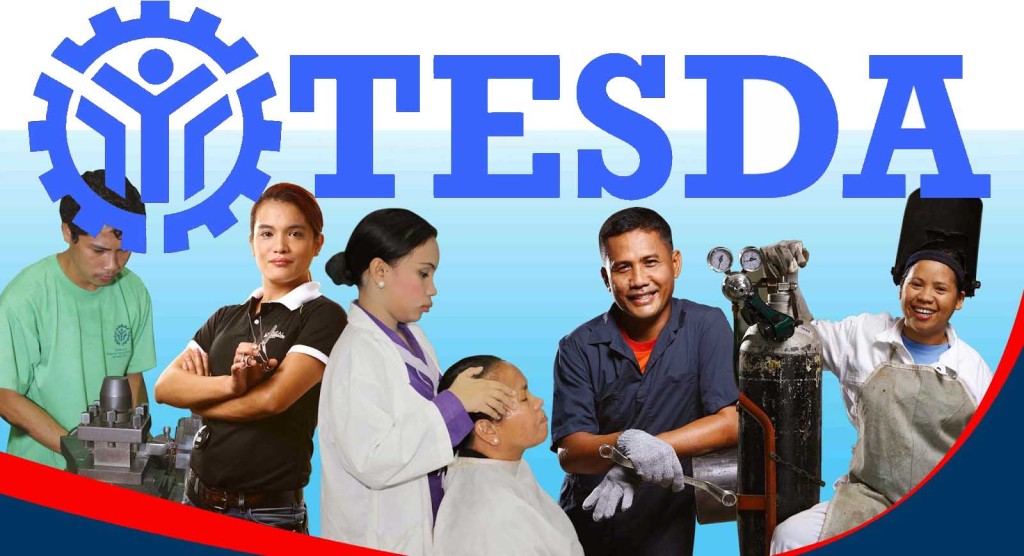
SONA 2019: Livelihood opportunities
Duterte has also urged support for OFWs’ reintegration for that moment when they decide to return for good in the country. This is why he has called time and again for the government to find ways to create more work and livelihood opportunities for OFWs in the Philippines.
“The government’s ultimate goal [for] OFWs is to [provide] them sustainable work and livelihood opportunities in our country. So someday, somehow, this will remain as one of the top priorities of my government,” said Duterte during the ceremonial conferment of the 2019 Model OFW Family of the Year.
In response, the Technical Education and Skills Development Authority (TESDA) has created a portal through their mobile app that helps returning OFWs register for scholarships for their special training programs. This program aims to retool and reskill returning OFWs to find employment opportunities in the country.
During the pandemic year, the Small Business Corporation (SB Corporation) of the Department of Trade and Industry launched a Php100-million loan facility to help returning OFWs launch businesses in the country. Each OFW who presents a successful business pitch could borrow anywhere from Php10,000 to Php100,000, free of interest and collateral. A service fee of 6% will be charged to loans with 24 months payment term and 8% for loans with 36 months payment terms (inclusive of 12 months grace period).
The challenge, however, remains in the hands of OFWs and the government as it faces a huge wave of unemployment among returning OFWs. A report from the United Nations International Organization Migration (IOM), published in 2021, revealed that an alarming 83 percent or at least 664,000 of 800,000 overseas Filipino workers worldwide have been jobless for at least three months when they returned home to the Philippines.
“[The] OFWs stated their biggest need was to obtain employment. Over 78 percent of all returning OFWs identified income generation as their greatest challenge,” the IOM report said.

SONA 2020: Pandemic response for OFWs
When the world faced the troubling pandemic last 2020, Duterte ensured that OFWs headed home will be given proper quarantine facilities and treatment. He has assigned the Inter Agency Task Force, DFA, and DOLE to come up with measures to provide quality quarantine facilities for OFWs coming from all over the world so that they would be reunited with their families at the soonest possible time.
He also approved the measure to provide a one-time financial assistance for OFWs through the DOLE-Abot Kamay ang Pagtulong (DOLE-AKAP) for OFWs, as part of the COVID-19 Adjustment Measures Program.
This gave a cash stipend of Php10,000 for OFWs who have been severely affected by the pandemic, including those who lost their jobs, those under a no work, no pay scheme, as well as those who contracted COVID-19.
To date, the Philippine government has repatriated over 600,000 OFWs since the beginning of the pandemic in 2020, and as of July 2021, almost 3,000 of these OFWs came from the UAE.
However, OFWs in the UAE lament the ongoing travel ban that the Philippines has imposed as they feel that their right to travel has been impeded by their very own government.
“Sana nagfinalize sila kung hanggang kelan talaga ang travel ban, and wag nang i-extend. Ang daming umaasang makakauwi na, yun pala nganga. Emotionally torturing ang ginagawa ng gov’t sa aming mga OFW,” said a concerned OFW.
Mylen Cantor shared that her hopes get crushed every 15 days: “Ang hirap ng situation namin dito. Araw araw kaming naghihintay ng magandang balita galing sa inyo tapos ngayon extend na naman ang ban. Alam nyo ba yung feeling ng naghihintay sa wala every 15 days?”
Rafael Fronda pleaded: “Iparating sa gobyerno ng Pilipinas at sa IATF. Hindi kami mamatay sa virus. Gobyerno ang papatay sa amin dito sa UAE. Fully vaccinated naman kami.”
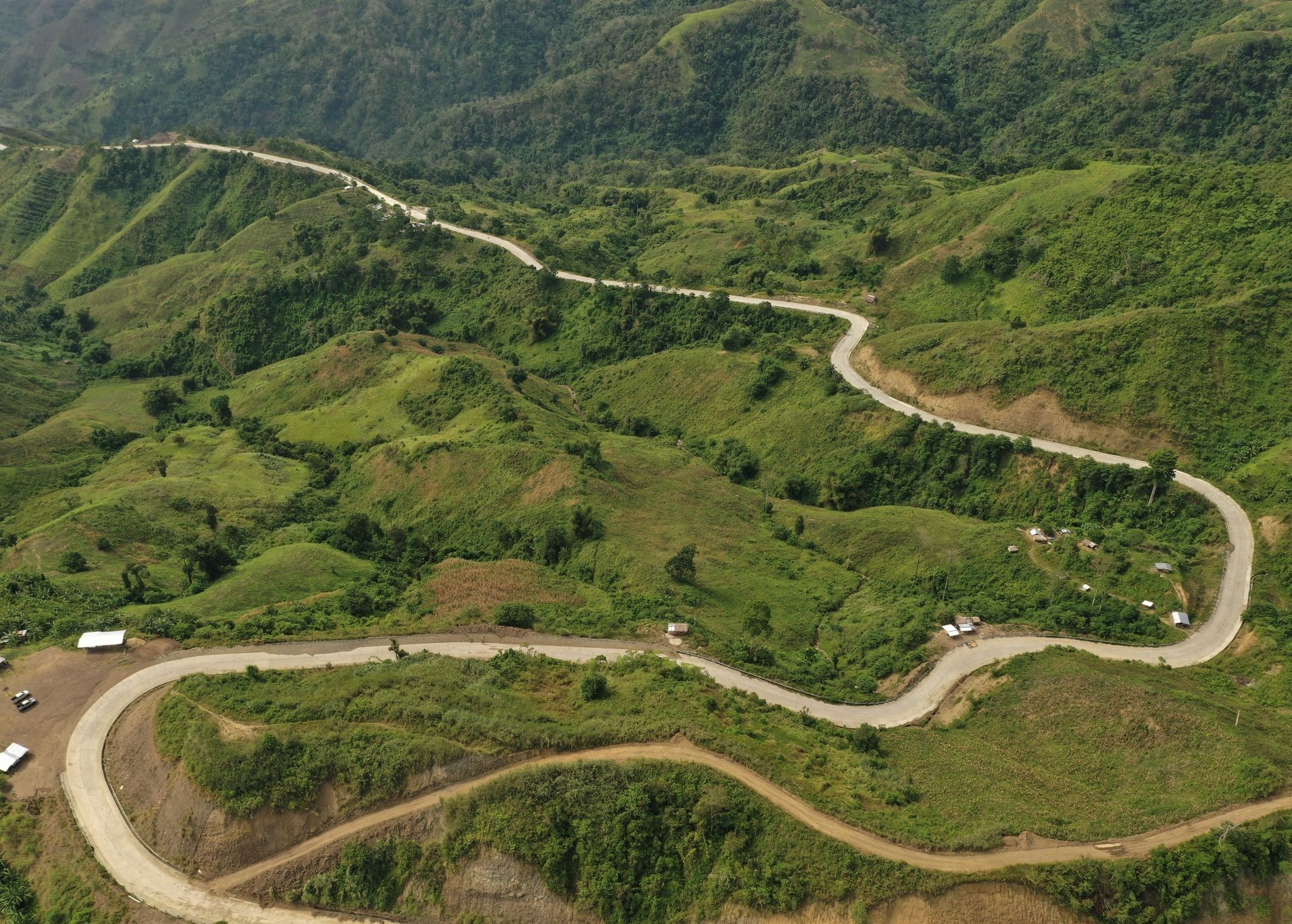
Building the Philippines
OFWs gave high marks to the Duterte administration’s ‘Build Build Build’ program that led to the fast-tracked completion on the construction of over 29,264 km of roads, 5,950 bridges, and 11,340 flood control structures since Duterte began his term in 2016. It also witnessed major improvements across 214 airport and 451 seaport projects.
Dr. Ben Lebig Jr, a corporate business planner, and registered financial planner and analyst states that the ‘Build Build Build’ program increased land, sea, and air connectivity among Filipinos which improved the country’s local trade and tourism industries.
“Build, Build, Build has allowed the Filipinos to witness the completion and the beginning of a number of Infrastructural projects (airports, roads, bridges etc.) during his term. These projects link farmers from far flung provinces to the cities where they can be utilized by the greater population, thus providing farmers higher income from their produce. Improved road and infrastructures also allow tourism to flourish which we have started to witness prior to the pandemic,” said Dr. Lebig.
He added that the ongoing railway projects will only be accomplished beyond Duterte’s term. These include the Metro Manila Subway which only began in 2019 after 40 years; the MRT-7 whose concession agreement was signed in 2008 but only officially began in 2016; the Common Station that has been stalled in 2009 whose construction only began in 2016; the LRT-1 Cavite Extension which has been delayed for 19 years and the Manila-Clark railway that was planned in 1993, both of which only began construction this 2021; and the LRT-2 East Extension project which was recently opened last July 2021. In addition, the MRT-3 has started to undergo a comprehensive rehabilitation.
Dr. Lebig noted that starting and committing to the construction of these railway projects should be supported by the next administration for the betterment of the public.
“I understand that the ‘Build Build Build’ project transcends administrations. It is my hope that the next administration would still have massive infrastructure projects be a priority agenda. Taking the example of the UAE – modern transportation systems and solid infrastructures are cornerstones of a steady and gradual economic development,” said Dr. Lebig.
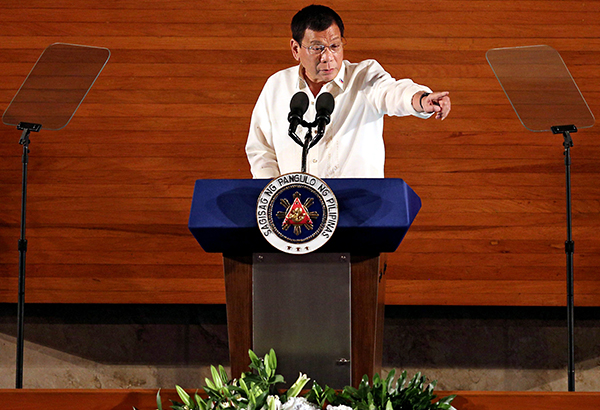
War on drugs
When 16 million Filipinos voted for Duterte into the presidency in 2016, they expected that the new administration will eradicate drugs within three to six months as he promised during his campaign. However, when the sixth-month deadline loomed, President Duterte realized that the problem of drugs was deeply rooted even within government-led agencies and even within the police.
President Duterte then led a two-pronged strategy of going after drug pushers and drug lords on the street while cleaning out his own administration of drug-compromised and corrupted officials.
Data from #RealNumbersPH show that from July 2016 to May 2021, the Duterte administration has arrested 293,841 individuals while 6,147 have died during anti-drug operations in what the critics of the Duterte administration cite as a ‘bloody’ war that has affected the lives of innocent Filipinos.
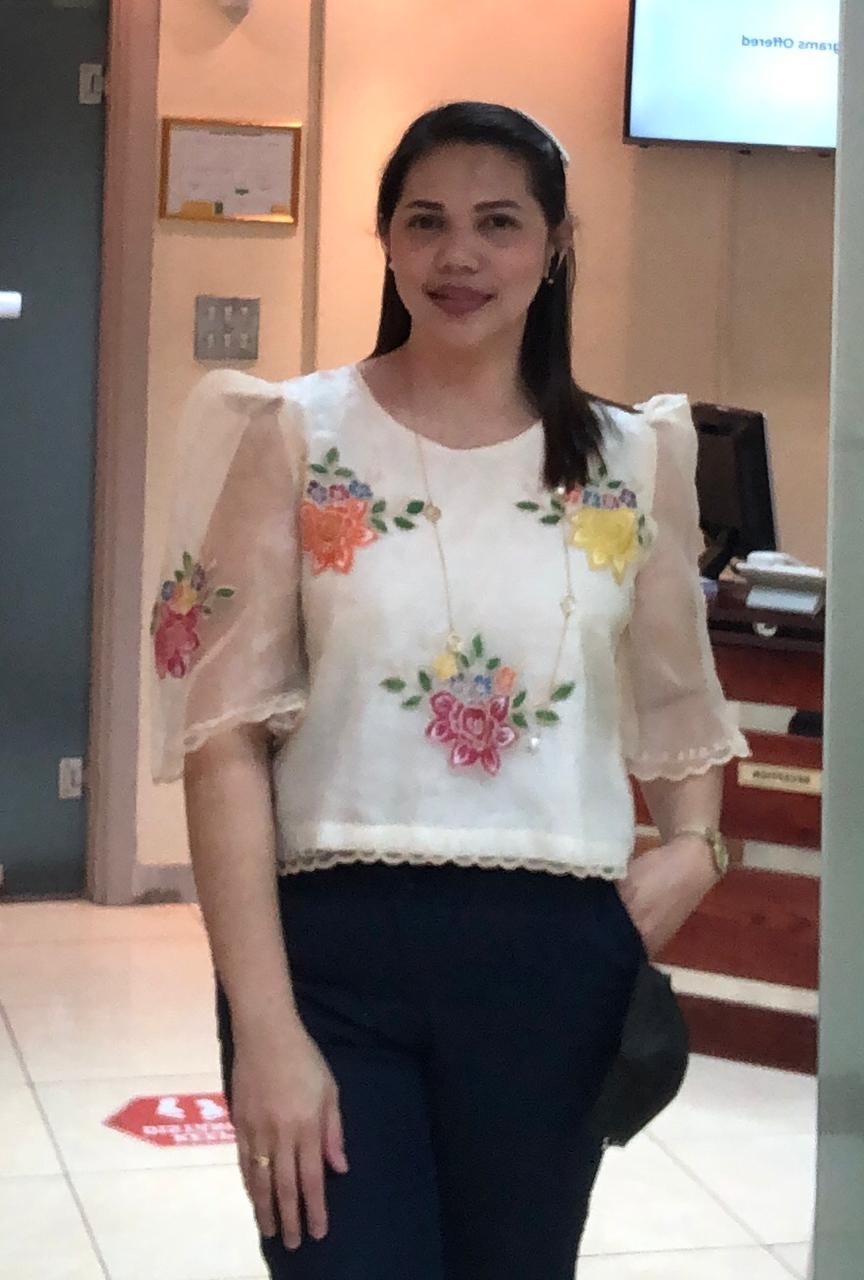
Ma. Concepcion Simera, a pharmacist in Abu Dhabi for over 14 years, considers this as a huge step of the government in preventing illegal drugs from reaching the hands of innocent children.
“Para sa akin, ang malawakang kampanya laban sa droga ang isang pinakamalaking hakbang na ginawa ng administrasyon bilang malasakit sa mga kabataan na sinasabing susunod na mga lider ng bayan,” said Simera.
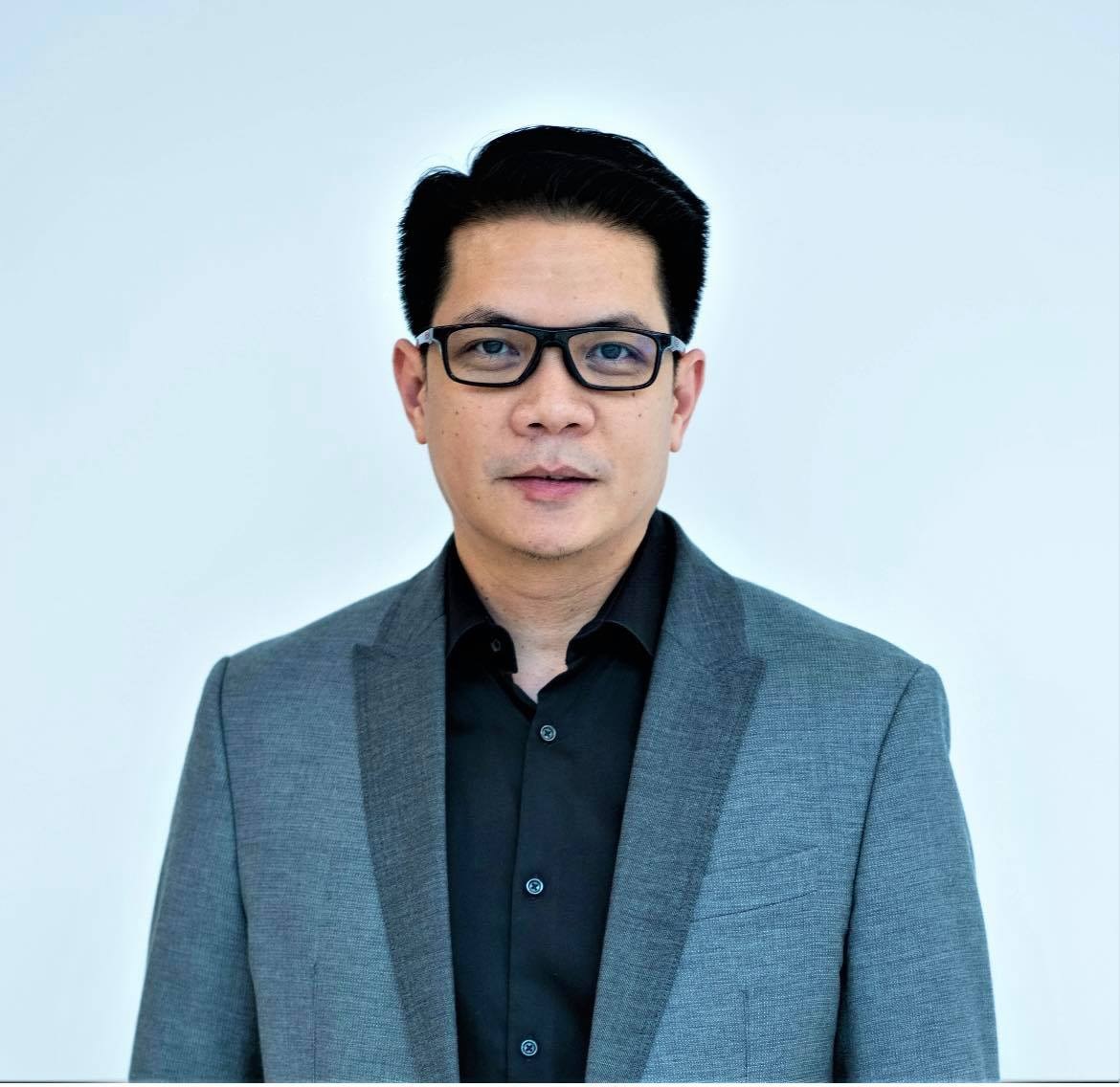
– Dr. Ben Lebig
Keep an eye out
Palacios-Manalo also noted President Duterte’s strong will helped force many companies who have been delinquent in their tax payments to pay the money they owe to the government, which have helped to fund many of this administration’s projects.
“Nahimok nyang pagbayarin ang mga naglalakihang mga kompanya na siya halos na nag-kokontrol ng ekonomiya sa ating bansa na magbabayad ng mga bilyon-bilyong utang sa buwis at mailaan ang pondong eto para sa mga programang nakalaan para sa kapakanan ng sambayanan,” said Palacios-Manalo.
Dr. Lebig hopes that all OFWs should remain vigilant and maintain a good balance between supporting the government’s drive towards progress while keeping an eye out for corruption and other illegal activities.
“My simple mantra is for us to support the government as long as they are doing what is right and beneficial to their constituents and to make our voices heard if we see corruption,” said Dr. Lebig.
He added that overseas Filipinos should neither blindly follow and agree to what the Philippine government tells them nor should they lambast and criticize each and every move that the government does.
“I feel that it will not serve our country well if we just focus on criticizing the government in everything they do, in the same way, that it’s also not good for the Philippines if we just blindly accept whatever is handed out to us by the administration. As Overseas Filipinos, I recommend that we all still stay vigilant on what is happening back home knowing too well that at some point we will re-integrate back to the Philippines,” said Dr. Lebig.
